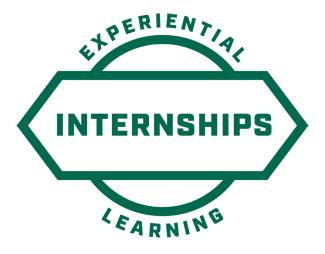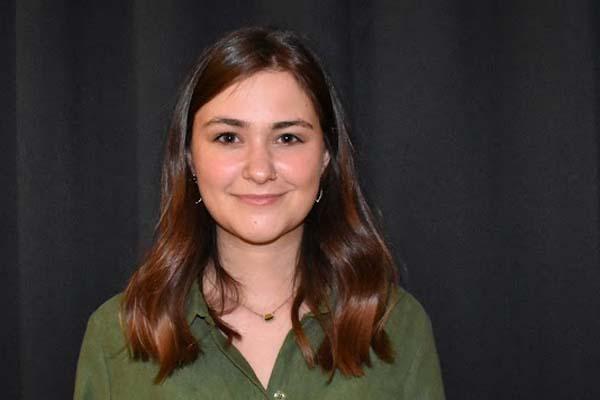
Jocelin Arbenz says Ohio Innocence Project internship gave her confidence for law school

Jocelin Arbenz hesitated when she got to college, not confident about her dream career. Now she enters her senior year at Ohio University excited about pursuing law school, especially after spending the summer interning alongside lawyers and law school students with the Ohio Innocence Project (OIP).
"Being a lawyer had always been my dream when I was younger, but going into college, I barely considered it an option because I was afraid of failure. I didn't think I was smart enough, so I focused on law-adjacent careers instead," Arbenz, who is majoring in sociology-criminology (opens in a new window) in the College of Arts and Sciences, with minors in psychology and business administration, said. "As I continued in my education though, I found myself jealous of people who were doing the things I wanted to do, and eventually, I thought to myself, 'Just do it then!' So many people's greatest hurdle is themselves holding them back, but if you just continue to push yourself, you will start to surprise yourself. I have grown tremendously since the day I decided to just go for what I want, and I am so happy that I am now able to be that motivation for myself."
Arbenz quickly got involved in law-related activities at OHIO, and thanks to generous funding provided by alumna Leah Recht (opens in a new window), Arbenz was awarded an eight-week, full-time internship with the Ohio Innocence Project at the University of Cincinnati College of Law.
"While working in the OIP office gave me incredible experience in the legal field among lawyers, I think working alongside law students was the most influential part for me," Arbenz said. "They made me feel comfortable in myself and my future in law school—and confident that I can achieve the things I want to achieve. Additionally, it was so incredible being surrounded by such supportive professionals, especially the policy director (and OHIO alumnus) Pierce Reed (opens in a new window), who made me feel valued and respected as a professional as well."
Arbenz's time was split between the policy side of OIP and the legal clinic.
"When working in policy, I typically spent my time doing research and organizing statistics for specific outreach and policy projects. Throughout the eight weeks, I primarily helped with projects focused on the Wrongful Conviction of Women, the Wrongful Conviction of Muslims, and Compensation for Exonerees. When working in the legal clinic, I helped with the intake process for clients, sending applications and follow-up letters, and preparing mail that needed to be sent out to prisons," she said.
Arbenz was the first student funded through the Center for Law, Justice and Culture Social Justice Internship Support Fund, which provided $2,500 stipend to help cover her costs.
"It's what made this experience possible for me," she said. "I was working full-time for OIP, about 9 a.m. to 5 p.m. Monday through Friday, so I didn't have time to be working another job as well, and I still had to pay rent and bills and everything else! The support fund made it possible for me to dedicate all my time to OIP, and enabled me to go on overnight trips to Columbus and Cleveland without having to worry about other responsibilities. I am so grateful for that financial support and for this experience!"
“Transformative experiential learning opportunities like this can be out of reach for students due to financial burdens,” said Larry Hayman, Esq. (opens in a new window), assistant director and pre-law advisor at the Center for Law, Justice and Culture (opens in a new window). “This reality led us to create the CLJC Social Justice Internship Support Fund with Attorney Recht’s support. Our strong institutional partnership with OIP led us to develop the OIP-CLJC Internship as our first placement site.”
According to Hayman, competition for the experience was steep.
“We had 23 students apply for the position. After a series of interviews, Jocelin was selected,” said Hayman, who served as the CLJC internship director for the experience, which consisted of biweekly meetings, a series of reflection papers, and check ins with OIP.
Arbenz's message to others who might be doubting themselves: "My best advice is to go for it! I was honestly terrified to work in an environment like OIP, alongside lawyers and law students, but I just went for it. In the beginning, I definitely had a sense of imposter syndrome, but the more I put myself out there, the more I felt that I deserved to be in that position. Stepping out of your comfort zone will show you everything you are capable of that you never would have expected."
Q&A with Jocelin Arbenz
Q: What was one of the most surprising things you discovered during your internship?
A: The most surprising thing for me was probably how much work the legal fellows take on! All of the fellows begin working with OIP the summer after their 1L (first-year of law school) and continue for the duration of their 2L year. I thought it was incredible how much work they do independently as well as alongside the lawyers. I could tell how much the lawyers valued the work of the legal fellows, and it is incredible the experiences these students are having, only a couple of years down the line from me.
The most difficult thing to get used to while working for OIP was definitely facing the harsh reality of the justice system, and all of the unjust roadblocks that exist when it comes to freeing someone who is wrongfully imprisoned. Sometimes, a case is rock solid, and you still cannot get a conviction overturned, just because of the stubbornness and pride of those in power.
Q: Who have been your favorite professors and how have they made an impact on your life?
A: My favorite professor here at OHIO has to be Dr. Amanda Cox (opens in a new window) in the sociology-criminology program. I love the way she approaches her classes and is always open to an honest discussion regardless of how sensitive or controversial a topic may be. She is welcoming of and values everyone's thoughts and opinions, and it truly fosters an incredible environment in her classroom. In the spring semester of last year, I took Ethics in Law, Crime, and Justice, and it really shaped the way I look at the law and was incredibly helpful when entering my internship. I had a core understanding of the injustices that occur within the justice system, and I was able to build upon that during OIP's 10-day intensive training period.
Q: What was your ah-ha moment during your internship—that point where you said to yourself, “I’ve got this!”?
A: As silly as it may sound, the first time I turned an assignment in to a policy fellow, they responded so positively and emphasized how helpful it really was. It made the work I was doing feel meaningful and like I was helping to push along the greater goal of OIP. It also instilled a sense of confidence in me that I carried through the rest of the summer, determined to produce as much quality work as possible during my time with them.
Q: Can you touch on the importance of the work you did during your time with OIP?
A: Working with OIP taught me a lot about how important while simultaneously insignificant the work we do is. It is all a part of a much bigger issue, and while the achievements of innocence lawyers are incredible and necessary, I do not feel you can properly take on such a heavy issue without constantly looking at what more you can do and what more the world around us could be doing. Of course, I am glad to take part in anything that helps move the project forward, but there is a bigger issue than just the fact that innocent people are in jail. Much of the issues stem from systemic racism, classism, and the social issues that surround us in everyday life. That being said, I am proud of the work I did to push along projects that will inform minorities in prison of our services and provide them with the support they no doubt will need during and after the process of exoneration.
Q: Did you have any prior internships, study abroad experiences, or research projects?
A: In the summer of 2021, I interned with the Survivor Advocacy Outreach Program. After completing a 40-hour training, I worked on education and outreach to support sexual assault, domestic violence, stalking, and human trafficking victims across seven counties in Southeast Ohio, including Athens. It was an incredible experience!
Q: What are your favorite OHIO memories?
A: My favorite OHIO memories are the ones I have created with my brothers in Phi Alpha Delta, the prelaw fraternity here on campus. I have loved being able to spend time with amazing people who share my same interests and values. The people I have met along the way, especially those who were older than me, are constantly inspiring me and encouraging me to grow and thrive. It is so important to surround yourself with people who make you better and make you feel loved.
Q: What's the one thing you would tell an OHIO student not to miss?
A: All of the opportunities that are provided to you by your department! Involvement fairs and job fairs can be so beneficial, and they exist for you to take advantage of! I know the CLJC puts on the law school fair and prelaw day and so many other opportunities for growing your network and future, and it is really worth attending all of these events and getting as much out of them as you can. It makes the future feel so much less daunting!


